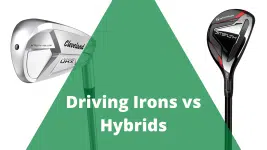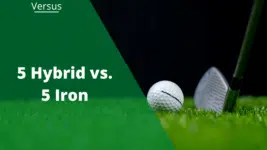Since golf is such an old game, sometimes clubs become obsolete, but that’s not the case with the 7-wood. Hybrids were only invented in 1998, but since then, they’ve been come very popular.
7-wood vs. hybrid: Which is right for you? 7-woods are built for power and distance, while hybrids are for accuracy. Hybrids are more forgiving from the rough and will be more manageable approaching greens. 7-woods will shorten par-5s and help you a lot off the tee should your driver and 3-wood let you down.
It seems long irons are a thing of the past as they simply don’t offer what a 7-wood or hybrid does. But to optimize your bag at the top end, you must decide between 7-wood vs. hybrid.
Read on to learn everything you need to know.
7 Wood vs. Hybrid—Which Is Right for You?
Play a hybrid if—You want more accuracy and the ability to shape the ball more. Also, a hybrid will suit your game better if you plan to play shots from the fairway more than the tee.
Play a 7-wood if—You want more distance and will use it mostly for long par-3s. 7-wood is great for those who have lost a bit of distance over the years and want to add a few yards.
In short, play a hybrid for accuracy and a 7-wood for distance. The design of the 7-wood lets you hit it off fairways, but out of the rough, it will be slightly less forgiving than a hybrid. If you play on a thick Bermuda rough course, you may want to opt for the hybrid.
7 Wood Or 4 Hybrid—Specs
| 7 Wood | Hybrid | |
| Length | 41” | 39.5” |
| Loft | 22° | 21° |
| Club Head Weight | 350g | 231g |
| Distance | More | Less |
Ball Flight Differences Between 7 Wood And Hybrid
Let’s break down the specific differences you’ll see in your trajectory while testing these clubs on the driving range. This way, there will be no surprises when you hit the course for the first time with either of them.
Distance:
Due to the head and shaft design, a 7-wood has more distance overall than the hybrid equivalent. Although we still call them woods, they are made of the same metal material that drivers are made of, providing a lot of ‘punch’ when struck correctly.
A 7-wood is also forgiving when it comes to distance as well. The face has a larger surface area, so when you miss the sweet spot, the 7-wood will compensate nicely, and you won’t lose as much distance as you will with a poorly struck hybrid.
Direction
As mentioned, a 7-wood has a larger face which helps maintain distance but at the cost of more unpredictable direction. While some 7-woods are more forgiving than others, none have the same accuracy as a hybrid.
For more skilled players, you will have increased control over your spin to work the ball left or right. This is especially useful on par-5s if you can reach in two and want to either play a piercing draw to roll it up on the front edge or a high, soft fade to get it to stop quickly on the green.
Height
Naturally, a hybrid will go higher than a 7-wood, but this also depends on the player. Those with steeper swings, commonly found in beginner and novice golfers, will create more height and may opt for a 7-wood loft to capitalize on the distance it provides.
For those who have trouble getting lift on any fairway wood or long iron, a hybrid will help you immensely. The weighting of a hybrid is designed to launch the ball higher so you can hold greens easier.
Manufacturing Differences Between 7 Wood And Hybrid
The look and feel are important when buying a new club. It should instill confidence as soon as you take the head cover off, so you feel great when you’re ready to pull the trigger.
Keep these aspects in mind when you’re comparing hybrid vs. 7-wood.
Shaft Length
You will notice right away that a 7-wood shaft is longer than a hybrid shaft. This adds distance by providing more flex so the clubhead can travel faster and produce more distance. The shorter shaft in a hybrid is still longer than your corresponding long iron but shorter than a 7-wood shaft.
Head Size
Another quite obvious difference between a 7-wood and a hybrid is the club head size. A 7-wood takes on the shape of a traditional wood that will resemble a miniature driver. A hybrid is a cross between a wood and an iron, so it takes on a shape of its own.
The backside of a hybrid looks like an amputated fairway wood, while long irons inspire the face and hosel. This is what gives a hybrid its versatility to be able to hit from almost any lie on the golf course.
Weighting
There is quite a significant difference in overall weight between a 7-wood and a hybrid. Due to the length and girth of a 7-wood, it weighs more than your average hybrid. These weights can vary depending on brand but never enough to make a hybrid weigh more than a 7-wood.
Having a heavy club head will benefit those with faster club head speeds because it will help them maintain a smooth tempo. A heavier head will cause you to swing even slower if you have a slower swing speed.
Sole Design
These clubs interact with the turf in very different ways. A hybrid is designed to operate from almost any lie it encounters. It’s capable of producing some large divots without slowing your clubhead down. The 7-wood sole is made to take much smaller divots so it can approach the impact zone on a more shallow attack angle.
The Best Hybrid To Replace Your 7 Wood
There are two options to consider if you’ve decided to pursue the 7 wood equivalent hybrid. You can swap it for a 3-hybrid or a 4-hybrid, with the more common choice being a 4-hybrid. Both are very similar in lofts and will produce similar distances.
This should be a relatively seamless transition because the lengths are also similar. Your posture and body position won’t change all that much. The only recommendation I can make is to ensure you move the ball slightly back in your stance with your 4-hybrid vs. 7-wood. Due to the length, design of the club head, and 4-hybrid loft, you can hit it more like an iron.
Which Is More Forgiving—Hybrid or 7 Wood?
There are two types of forgiveness at play here, and each player will weigh them differently regarding their importance to their game. Do you want forgiveness with distance or forgiveness with accuracy? Let me explain.
If you don’t hit a long ball, you must get the most out of each shot since your misses tend to come up short. This means you want distance forgiveness, and you will find more success with a 7-wood vs. 4-hybrid.
If you don’t hit an accurate ball, you must get the most out of your misses so you can still find the fairway, and you’ll find that with a hybrid.
For beginners and novice golfers, you’ll find overall forgiveness with a hybrid simply because it’s shorter and easier to hit off the ground. We all want distance, and you have your whole golf career to search for more of it, but now, focus on reducing your mistakes, which will be easier to do with a hybrid.
Alternatives To A 4-Hybrid
If you’re not sold on the 4-hybrid, you can take it one step down and go for a 5-hybrid, adding loft and accuracy. A 5-hybrid will be shorter and easier to manage out of both thick and thin lies.
If you are considering this, ensure you optimize your lofts so there is a smooth transition to your irons. A 5-hybrid will be very similar to a 5-iron, so you don’t want redundancy within your set.
Read More: The Best Hybrid Golf Clubs
Alternatives To A 7-Wood
If you’re not in love with your 7-wood and not ready to transition to a 4-hybrid, then you can select either a 3-hybrid or a 3-iron. The advantage of the iron over the hybrid will be shot control. In the hands of a skilled player, a 3-iron has many more options, as it’s easier to control your trajectory.
The forgiveness of a hybrid naturally reduces ball spin, but on a 3-iron, you can get some serious RPMs. This makes it easier to work around a corner or hit arguably one of the most beautiful shots in all of golf — the stinger.
Read More: The Best Fairway Woods
FAQ
Is A 7 Wood Better Than A Hybrid?
Yes, a 7-wood is better than a hybrid if you want distance. But if you’re looking for more accuracy and the ability to play from various lies, then a hybrid will be a better choice for you. 7-woods are better in the hands of faster and slightly more consistent golfers to get the most out of this style of fairway wood.
What Does A 7-Wood Replace?
A 7-wood will replace either your 4-hybrid, 4-iron, or 3-iron. Each player will have different needs at this end of their set, so there is no clear-cut answer as to which exact club a 7-wood will replace. However, you need only one of the three mentioned above since your ball flight will be similar to all, so an unbiased testing session is the best way to make a decision.
Does A 7 Wood Go Further Than A 4 Hybrid?
Yes, a 7-wood goes further than a 4-hybrid. This is because it’s longer and has a specially designed head that produces a more active club face. The 7-wood is modeled more closely to the driver regarding design features, which means it’s heavier and has a hotter face to produce more distance in the air and on the ground once the ball lands.
Do Any Pros Use A 7 Wood?
Yes, a few pros use a 7-wood, and there may be more in the coming seasons. Players like Dustin Johnson, Adam Scott, and Bubba Watson have all been seen with 7-woods in their bags recently, and it seems to be trending upward. Pros will adjust their set to accommodate the course they are playing, so you may not see it every week but rest assured, many pros have a 7-wood sitting at home waiting to be called upon.
Do You Need Both Clubs In Your Bag?
No, you do not need both clubs in your bag. While they produce different shots and have different designs and feels, they are too similar to expend any of your fourteen allotted spots within your set. You would much rather have an extra wedge since you will spend more time inside 100 yards than outside 180, which is approximately the minimum distance for these clubs.
Why Are Hybrids More Common Than 7-Woods?
Hybrids are more common than 7-woods because they are easier to hit for beginners, novice, and intermediate players. Golfers willing to sacrifice a few yards of distance will be rewarded with more accuracy and versatility from various lies. Hybrids are also lighter, so they cater to older players and women much more.
Summary
In the debate between a 7-wood vs a hybrid, it pays to know what kind of game you play and how you strike the ball.
If you’re new to the game, then go for the hybrid right away, and as your skills progress, you can think about switching.
Advanced players looking to hone their yardages and attack golf courses more may be surprised to find out that a 7-wood benefits them.
The stigma of them only being for women and seniors has been thrown out the window, so if you’re serious about your game, be sure to weigh all your options to make an unbiased choice.
Clint is PGA-certified and was a Head Teaching Professional at one of Toronto's busiest golf academies. He was also featured on Canada's National Golf TV program, "Score Golf Canada," twice. He graduated with a degree in Golf Management from the College of the Desert in California and studied under Callaway's co-founder, Tony Manzoni.
He has a handicap index of 6.2 and spends the winters near Oaxaca, Mexico, where he plays twice a month at the Club de Golf Vista Hermosa. He's written over 100 articles at GolfSpan since 2021. You can connect with Clint at LinkedIn, FB, his website, or Clintcpga@gmail.com.
- Best score: 68
- Favorite club: Odyssey White Hot Two-Ball Center-Shafted Putter
- Favorite ball: Titleist Pro V1x
- Favorite food at the turn: Hot dog







